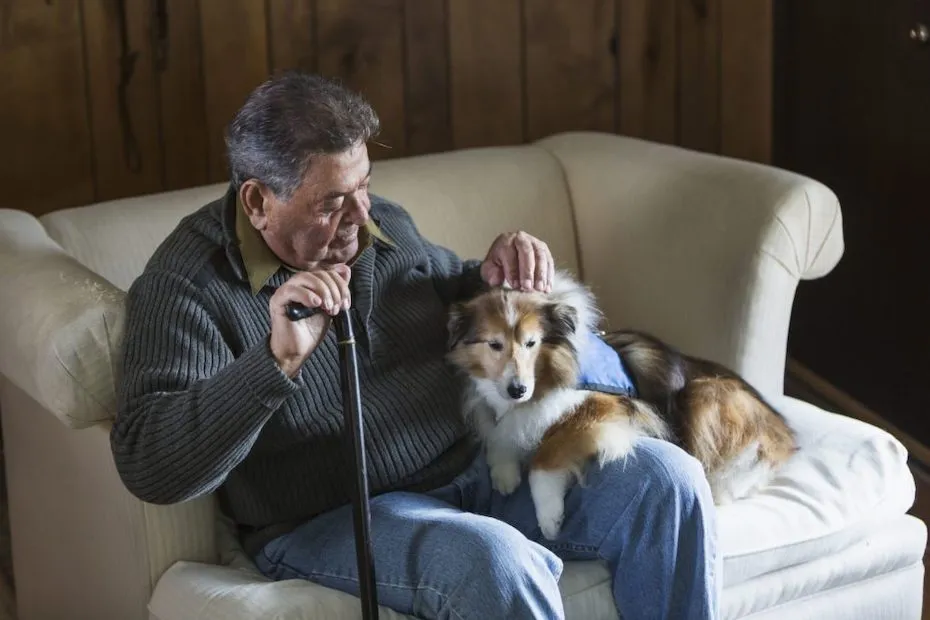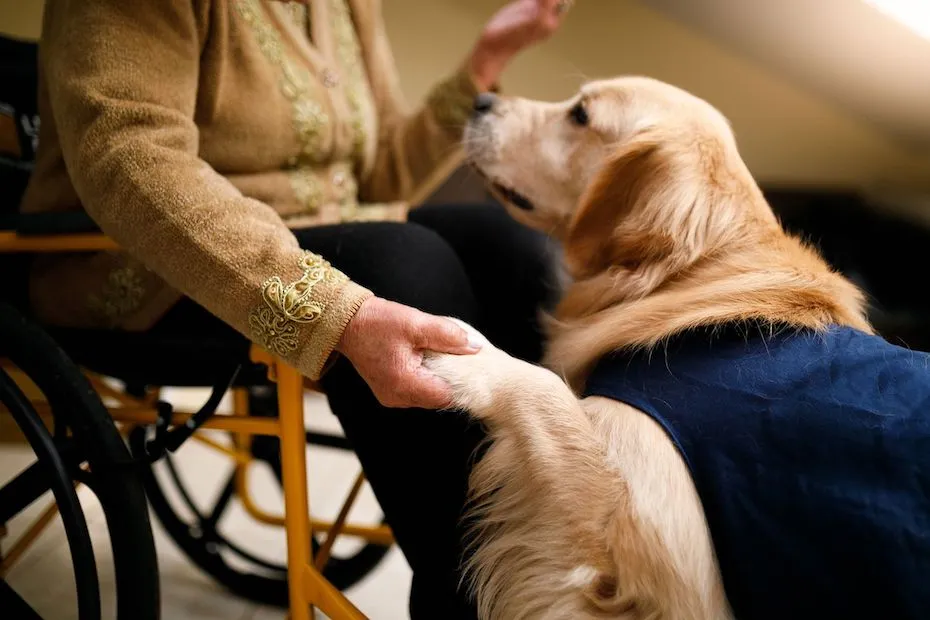Service dogs are remarkable animals that provide indispensable assistance to individuals with disabilities, enhancing their independence and quality of life. Among the many specialized roles these loyal companions fill, support for balance and mobility stands out as particularly vital. For those facing challenges with stability, gait, or movement, a service dog trained for balance can offer crucial physical support, preventing falls and assisting with daily tasks. Choosing the right breed for this demanding role is paramount, as it requires specific physical attributes and an exceptional temperament. This article delves into the characteristics that make a dog suitable for balance and mobility support, highlighting the Best Service Dog Breeds For Balance and how they empower their human partners.
Understanding Service Dogs for Balance and Mobility
Service dogs dedicated to balance and mobility support fall under the broader category of mobility assistance dogs. These specially trained canines perform a variety of tasks tailored to their partner’s unique needs, such as retrieving dropped items, opening doors, and operating light switches. A key aspect of their training involves bracing, where the dog acts as a stable anchor, allowing their human partner to lean on them for support while walking, standing up, or regaining equilibrium. This bracing ability is especially beneficial for individuals with conditions affecting their balance, spinal cord injuries, brain injuries, muscular dystrophy, arthritis, or cerebral palsy. These dogs provide a sense of security and confidence, reducing the risk of falls and enabling greater independence in navigating daily life. Some mobility assistance dogs are even trained to assist owners in wheelchairs, helping with transfers and pulling the chair.
Key Traits of Service Dogs for Balance Support
While all service dogs require intelligence and a calm demeanor, dogs trained for balance and mobility support need additional specific qualities. The effectiveness of a “balance dog” hinges significantly on its physical strength, size, and unwavering stability. Bracing dogs, for example, must be substantial enough to support a person, typically weighing 55 pounds or more. Beyond physical attributes, a dog’s temperament and willingness to work are crucial.
Here are the critical characteristics that define the best service dog breeds for balance:
- Size and Strength: A dog must be large and strong enough to bear a portion of its handler’s weight without injury to itself or its handler. This ensures reliable bracing and steady support.
- Calm and Stable Demeanor: Service dogs must remain composed in various environments, from crowded public spaces to quiet homes. A dog that is easily startled or overly excitable would be unsuitable for providing consistent balance support.
- Intelligence and Trainability: The ability to learn complex tasks and make sound judgments in unpredictable situations is essential. These dogs must understand specific commands for bracing, guiding, and retrieving, often anticipating their handler’s needs.
- A Desire to Work: A good service dog actively enjoys its duties and is motivated to assist its partner. This intrinsic motivation translates into consistent and reliable performance.
- Friendly and Confident Disposition: They must be comfortable interacting with people and other animals without showing aggression or undue timidity. A confident dog is less likely to be distracted or overwhelmed in public settings.
- Strong Bond with Handler: A deep, trusting relationship between the dog and its handler is the foundation of successful service work. This bond enhances communication and the dog’s responsiveness to its partner’s subtle cues.
Top Breeds for Balance and Mobility Support
Considering the demanding requirements, several dog breeds consistently excel as service dogs for balance and mobility. These breeds combine the necessary physical strength with the ideal temperament and intelligence for such specialized work. When considering the ideal service dog types for balance support, understanding these breeds is key.
Labradors (American and English)
Labradors are a perennial favorite for service work, and for good reason. Their moderate to large size (typically 55-80 pounds), sturdy build, and eager-to-please nature make them excellent candidates for balance support. They possess a calm temperament, high intelligence, and are highly trainable. Labradors are known for their unwavering loyalty and gentle disposition, which are crucial for forming a strong bond with their handler. Their robust physique allows them to provide steady bracing without difficulty.
Golden Retrievers
Similar to Labradors, Golden Retrievers are beloved for their friendly nature, intelligence, and trainability. They are typically medium to large dogs (55-75 pounds) with a well-muscled build, offering reliable support for individuals needing balance assistance. Their patient and calm demeanor, coupled with an innate desire to help, makes them exceptionally well-suited for service dog roles. Golden Retrievers are also known for their soft mouths, making them adept at retrieving delicate items without damage.
 Types of service dogs showing the best breeds for service dogs*An infographic illustrating various types of service dogs, including those suitable for balance and mobility assistance, highlighting their specific roles and ideal breeds.*
Types of service dogs showing the best breeds for service dogs*An infographic illustrating various types of service dogs, including those suitable for balance and mobility assistance, highlighting their specific roles and ideal breeds.*
German Shepherds
German Shepherds are renowned for their intelligence, strength, and protective instincts. Weighing between 50-90 pounds, their muscular and agile build makes them capable of providing substantial balance support. While often associated with protection work, well-bred German Shepherds possess a loyal and calm temperament when properly trained. Their sharp minds and strong work ethic allow them to learn complex tasks quickly and perform them reliably, making them effective mobility assistance dogs. It’s crucial to select German Shepherds with a stable temperament for this role.
Poodles (Standard)
While often perceived as smaller dogs, Standard Poodles are surprisingly robust and intelligent. They typically weigh 40-70 pounds, and their lean but muscular build can provide adequate support for many individuals. Standard Poodles are highly intelligent, making them exceptionally trainable for intricate service tasks. Their hypoallergenic coats are a significant advantage for handlers with allergies, and their elegant demeanor belies their strength and stamina. A well-trained Standard Poodle can be an excellent choice for balance assistance.
 Service dog with man sitting on couch*A service dog calmly sitting beside its human partner on a couch, showcasing the companionship and support a trained canine provides.*
Service dog with man sitting on couch*A service dog calmly sitting beside its human partner on a couch, showcasing the companionship and support a trained canine provides.*
Great Danes
Great Danes are gentle giants, often weighing 100-200 pounds. Their imposing size and powerful build make them exceptionally capable of providing bracing support for individuals with significant balance issues. Despite their size, Great Danes are known for their calm, friendly, and patient disposition, often referred to as “velcro dogs” due to their desire to be close to their families. Their height can also be an advantage for individuals who need support for standing or reaching higher objects. However, their shorter lifespan and potential for certain health issues should be considered.
Bernese Mountain Dogs
Bernese Mountain Dogs are large, sturdy dogs, typically weighing 70-115 pounds, with a calm and affectionate nature. Their robust build and powerful frame make them well-suited for providing reliable balance support. Bernese Mountain Dogs are known for their loyalty, good-natured temperament, and patience, which are essential for a service dog. They thrive on having a job to do and forming strong bonds with their human partners. Their thick coats require regular grooming, but their gentle giants are excellent for mobility tasks.
Boxers
Boxers are medium to large dogs, typically weighing 50-80 pounds, known for their strong, muscular build and energetic yet loyal personalities. While often playful, well-trained Boxers can be incredibly focused and dedicated service dogs. Their strength makes them suitable for bracing, and their intelligence allows them to learn and execute complex commands. It’s important to select a Boxer with a calm and focused temperament for service work, as their natural exuberance needs to be channeled effectively.
 Service dog with woman in wheelchair*A mobility assistance dog attentively working alongside a woman in a wheelchair, demonstrating specialized support for navigation and daily tasks.*
Service dog with woman in wheelchair*A mobility assistance dog attentively working alongside a woman in a wheelchair, demonstrating specialized support for navigation and daily tasks.*
Training and Partnership: What to Expect
The journey to becoming a service dog for balance is extensive and highly specialized. These dogs undergo rigorous training that goes far beyond basic obedience. They are taught specific tasks, such as bracing on command, maintaining a steady pace, anticipating potential falls, and providing deep pressure stimulation. The training typically begins when the dog is a puppy, focusing on socialization, temperament assessment, and foundational skills, before progressing to advanced task-specific training.
Establishing a strong partnership between the dog and its handler is crucial. This involves not only the dog learning tasks but also the handler learning to effectively communicate with and rely on their canine partner. The bond that develops between an individual and their service dog for balance is incredibly powerful, offering not just physical assistance but also profound emotional support and companionship. This partnership can significantly enhance the handler’s confidence, independence, and overall well-being.
Conclusion
Choosing the best service dog breeds for balance is a decision that can profoundly impact an individual’s life. The ideal balance support dog combines physical strength and stability with a calm, intelligent, and devoted temperament. Breeds like Labradors, Golden Retrievers, German Shepherds, Standard Poodles, Great Danes, Bernese Mountain Dogs, and Boxers consistently demonstrate the qualities necessary for this vital role. Through specialized training and a deep, trusting partnership, these incredible canines provide essential physical support, enabling greater independence and a significantly improved quality of life for their human companions. If you’re considering a service dog for balance, thoroughly research reputable organizations and consult with experts to find the perfect canine partner.
